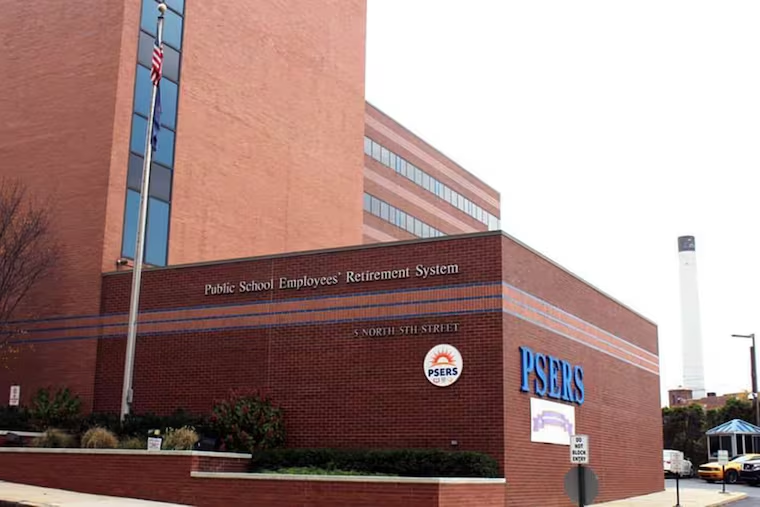PSERS investment adviser fined $1.5 million over miscalculation
Aon agreed to pay the fine after SEC found it failed to review "discrepancies" in a report exaggerating PSERS pension investment profits.

The Securities and Exchange Commission has slapped $1.5 million in penalties, refunds, and interest on consultant Aon Investments USA Inc. to settle charges the Chicago firm misled the Pennsylvania Public School Employees’ Retirement System (PSERS) about errors that caused an exaggerated profit report for 2011-2020.
The miscalculation was a subject of two federal investigations. It also figured in a boardroom fight over the agency’s investments that led to the 2021 retirement or resignation of top PSERS executives and a multibillion-dollar reallocation away from private investments by its governing board.
After correcting the error, PSERS had to boost payroll deductions from 100,000 of the public school employees who contributed to the retirement plan to help cover its poor results. PSERS manages investments worth around $70 billion to help pay pensions to half a million current and retired public school staff.
“Investment advisers must be scrupulously honest with their clients,” LeeAnn G. Gaunt, chief of the SEC’s Public Finance Abuse Unit, said in a statement. “Pension funds and other municipal entities should be able to trust that their investment advisers are telling them the truth.”
Aon spokesman Robert Elfinger said, “We are pleased to have resolved this matter,” which didn’t affect PSERS’ actual assets.
In 2020, when data that Aon provided PSERS for the 2011-2020 calculation didn’t match PSERS’ published quarterly returns for some periods, state Treasurer Joe Torsella, who served on the board, asked PSERS executives to explain. Reassured by Aon, the PSERS leaders convinced its board to approve the report in December anyway.
According to the SEC, when PSERS “repeatedly questioned” the discrepancy, Aon partner Claire P. Shaughnessy, who oversaw Aon’s work calculating PSERS returns, “failed to adequately investigate that discrepancy” and instead gave reasons that Aon already knew weren’t accurate. She denied Aon had erred, “when, in fact, she did not know the reason for the discrepancy,” the SEC said.
Shaughnessy was “at least negligent” and “willfully violated” securities law, the SEC concluded. She failed to check data when PSERS asked for explanations and instead made false claims — alternately citing public and private investment valuation errors for the discrepancy.
Aon “willfully” violated securities law by giving PSERS inaccurate information and then “made material misstatements” and “omitted facts” even after PSERS realized that the numbers were wrong and that it had to restate its results, the SEC said.
Under terms of the settlement, neither Shaughnessy nor Aon admitted wrongdoing.
The miscalculation, along with PSERS’ purchase of unappraised properties, was investigated by a federal grand jury in Philadelphia in a probe that ended without charges in 2022. The separate SEC investigation focused on the miscalculation and also on PSERS advisers’ possible exchange of gifts with money managers who sought to be hired by PSERS.
The SEC has told PSERS that investigation will not result in enforcement actions against the pension plan, PSERS said in its statement Thursday.
“I’m pleased that the SEC’s investigation has cast light onto how these reporting inaccuracies occurred,” current Treasurer Stacy Garrity, who led calls for new pension leadership and now heads the board’s audit committee, said in a statement. She added that recent reforms should help ensure “a culture of independent oversight” as the board tries to improve disclosure and investment reporting.
SEC and PSERS officials would not comment on whether the agency is still investigating PSERS’ outside consultants and money management firms. (Update Feb. 10:) The Inquirer has since confirmed that the SEC has alerted at least three of the consultants that they will not face enforcement actions related to information collected in the investigation.
“We are pleased with the developments today from the SEC and equally excited to be sharing such positive news with our members,” PSERS’ new board chairman Richard Vague said in a statement.
Under federal laws governing nonprofits, Aon’s error forced PSERS to recalculate returns. Under state pension law, when the new, slightly worse returns were posted in spring 2021, the agency was forced to boost payroll deductions from 100,000 mostly younger teachers and other early-career employees to help cover its poor results. Based on the earlier incorrect data, PSERS had announced no increase would be needed.
That extra charge, which took 50 to 75 cents of every $100 from the affected staffers’ pay, will end in July, thanks to better returns in 2020-23. Most teachers will go back to putting 8% of their annual pay into the plan next fiscal year, or over $1 billion total. PSERS also collects over $5 billion a year from state and local taxes and a varying amount from investment profits.
In addition to the penalty against Aon, Shaughnessy was fined $30,000. Shaughnessy left Aon in late 2022 and joined another national financial consulting firm. Aon declined to comment on her departure.
Aon also faces a PSERS lawsuit in Philadelphia Common Pleas Court, demanding the firm compensate PSERS for at least $8.8 million it spent on defense lawyers, advisers and consultants since the miscalculation came to light. That case is scheduled for trial later this year.
PSERS said it is reviewing the SEC settlement against Aon. Neither side would comment on its effect on PSERS’ lawsuit.
Aon has argued in court that it should not have to pay PSERS damages because it was following accepted procedures and that PSERS’ had extra expenses due to reasons unrelated to the miscalculation.
PSERS hired Aon to produce investment data starting in 2010. The agency’s board agreed in 2022 to cancel Aon’s most recent, five-year $3.4 million contract and prepare the lawsuit, though Aon continued advising PSERS as recently as last year and continued to use its data in calculating investment returns.